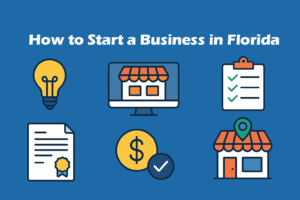Starting a business in Georgia can be an exciting opportunity for entrepreneurs who want to bring their ideas to life. From developing your concept to marketing your brand, each step plays an important role in establishing a successful company. Below is a complete guide on how to start your business in Georgia, including the registration process, official fees, and essential steps to help you move forward confidently.
Discovering the Right Business Idea
Before registering a business, the most important step is choosing the right business idea. Consider what you are passionate about, the problems people face, and how your product or service can solve them. Take into account your skills, experience, and available resources. Some entrepreneurs start small with local services like cleaning, landscaping, or food trucks, while others explore online opportunities such as e-commerce, consulting, or digital marketing. Once you have an idea, research your target market and test your concept with a small audience before investing heavily.
Crafting a Strategic Business Plan
A well-prepared business plan is essential because it helps you organize your ideas, attract investors, and map out a clear path for growth. This document should cover your business goals, products or services, target market, competitive landscape, marketing strategies, operations plan, and financial projections. While it doesn’t need to be overly complicated, it must be clear, realistic, and actionable. Even if you are the only one reading it, writing a business plan can reveal potential challenges early and help you make informed decisions as your business develops. For guidance on creating a business plan, you can visit the U.S. Small Business Administration (SBA) Business Guide.
Selecting the Right Business Structure
Choosing the right business structure is a crucial step, as it affects legal responsibilities, taxes, and personal liability. In Georgia, options include Sole Proprietorships, Partnerships, LLCs, and Corporations. A Sole Proprietorship is simple and affordable but offers no liability protection. A Partnership allows shared ownership and profits but also shares risks. An LLC is popular for small to mid-sized businesses because it provides liability protection and management flexibility. Corporations suit larger businesses or those seeking investors, offering strong legal protection but requiring more compliance. Your choice should align with your business goals, growth plans, and how you want to handle taxes and liability. For more information on business structures, you can refer to the IRS guide on choosing a business structure.
Officially Registering Your Business in Georgia
After choosing your structure and business name, you need to register your company with the Georgia Secretary of State. Start by checking if your desired business name is available on the state’s official website. You can also reserve a name for a small fee if you are not ready to file immediately.
To establish an LLC, file the Articles of Organization, and for a Corporation, submit the Articles of Incorporation. In Georgia, the registration fee for an LLC is approximately $110 if filed by mail, while a Corporation costs $50 for profit and $30 for nonprofit entities. Online filings may cost around $105 including the service charge. Expedited filing services are available for faster processing, costing $60 for two-business-day service or $275 for same-day service. Once approved, your business becomes a legal entity recognized by the state. You can find more details on business registration at the Georgia Secretary of State Business Registration page.
Appointing a Reliable Registered Agent
Every business in Georgia must designate a registered agent to receive important government and legal documents on behalf of the company. The agent must have a physical address in Georgia and be available during business hours. You may act as your own registered agent if you meet these requirements, but hiring a professional service is often preferred for reliability and privacy. The annual cost for a registered agent typically ranges from $100 to $200 depending on the provider.
Obtaining Your Employer Identification Number (EIN)
An Employer Identification Number (EIN) is like a social security number for your business. It is required for opening a business bank account, hiring employees, and filing taxes. You can apply directly through the IRS website by completing Form SS-4. The application process is simple and free if done through the IRS, and approval is usually immediate when applied online. Once obtained, your EIN allows you to set up financial accounts and fulfill tax obligations efficiently. Apply for your EIN here: IRS EIN Application.
Securing Business Funding and Essential Insurance
Funding is a critical aspect of starting a business. You may choose to use personal savings, seek loans, approach friends or family, or attract investors. The U.S. Small Business Administration (SBA) also offers loan programs designed to support startups and small businesses. In addition to funding, protecting your business with insurance is crucial. Common types of insurance include general liability, professional liability, workers’ compensation, property insurance, and business interruption coverage. Proper insurance safeguards your assets and ensures compliance with Georgia’s business regulations.
Building a Strong Marketing Presence
Marketing is the key to attracting customers and growing your business. Start by defining your target audience and building a consistent brand identity, including a professional logo and messaging. Establish an online presence through a website, social media, and local directories. Employ digital marketing strategies such as search engine optimization (SEO), content marketing, email campaigns, and online advertisements. For local businesses, word-of-mouth, community engagement, flyers, networking, and participation in local events can also be highly effective. Monitor your marketing performance regularly, analyze what works best, and refine your strategies to maximize impact.
Final Thoughts
Starting a business in Georgia can be smooth and rewarding if approached systematically. By validating your idea, selecting the right business structure, registering your company properly, obtaining your EIN, securing funding and insurance, and implementing effective marketing strategies, you set a solid foundation for success. With consistent effort, careful planning, and strategic execution, you can grow your business confidently and achieve your entrepreneurial goals in Georgia.







